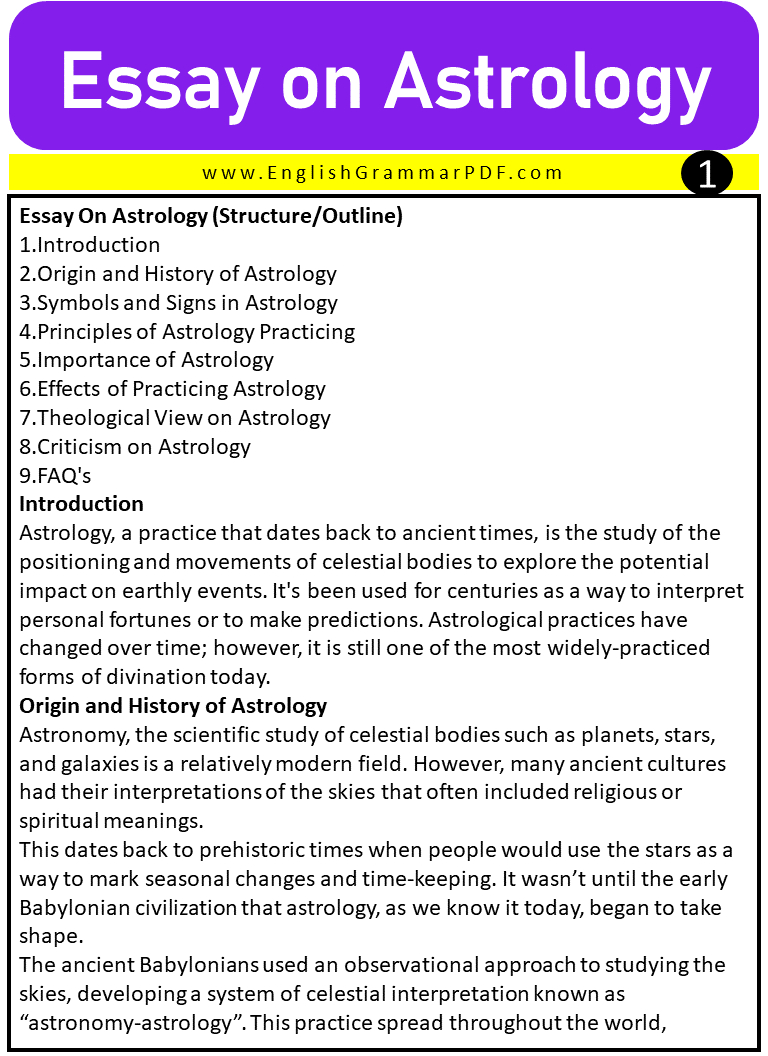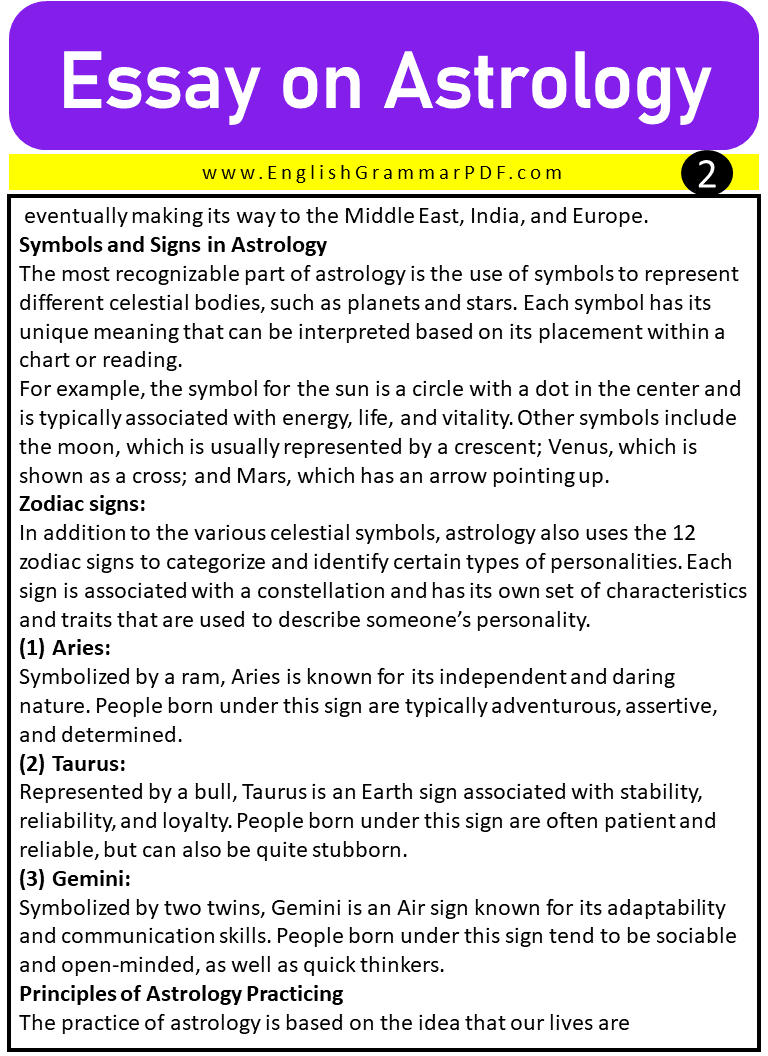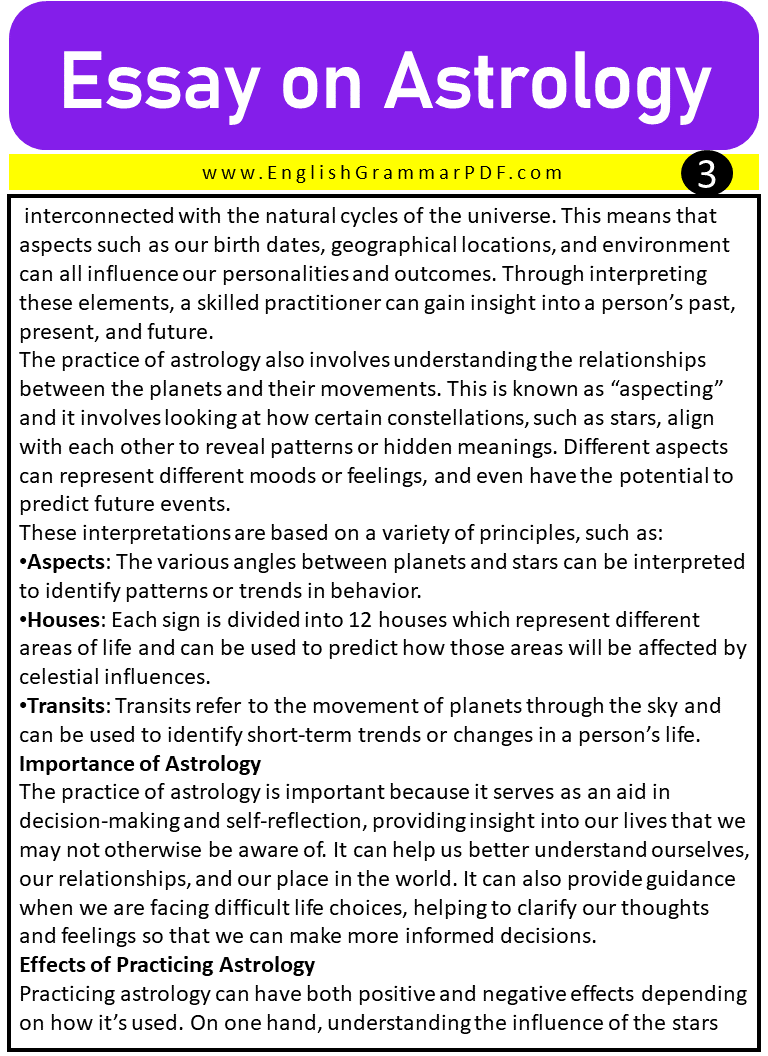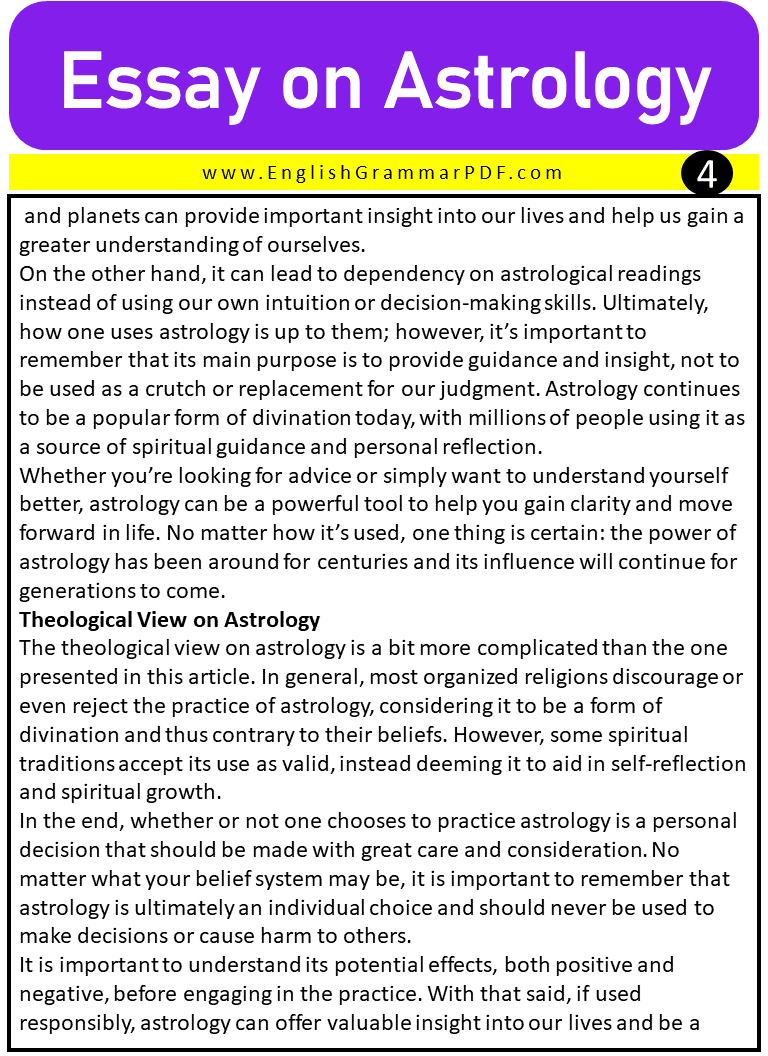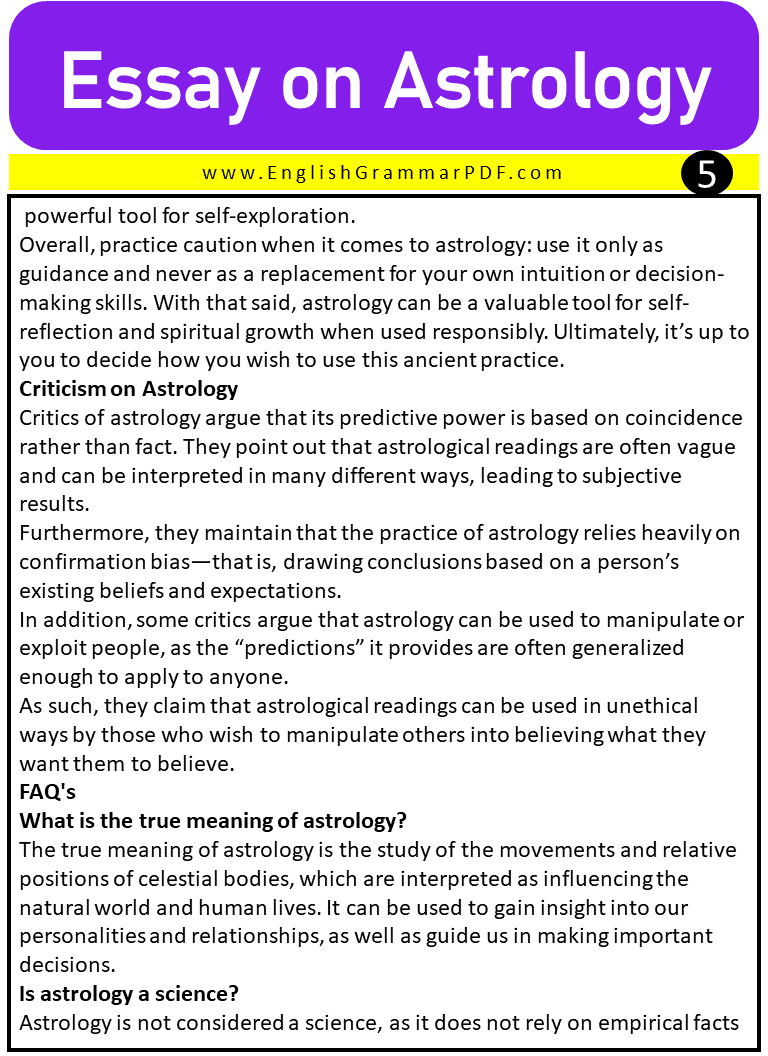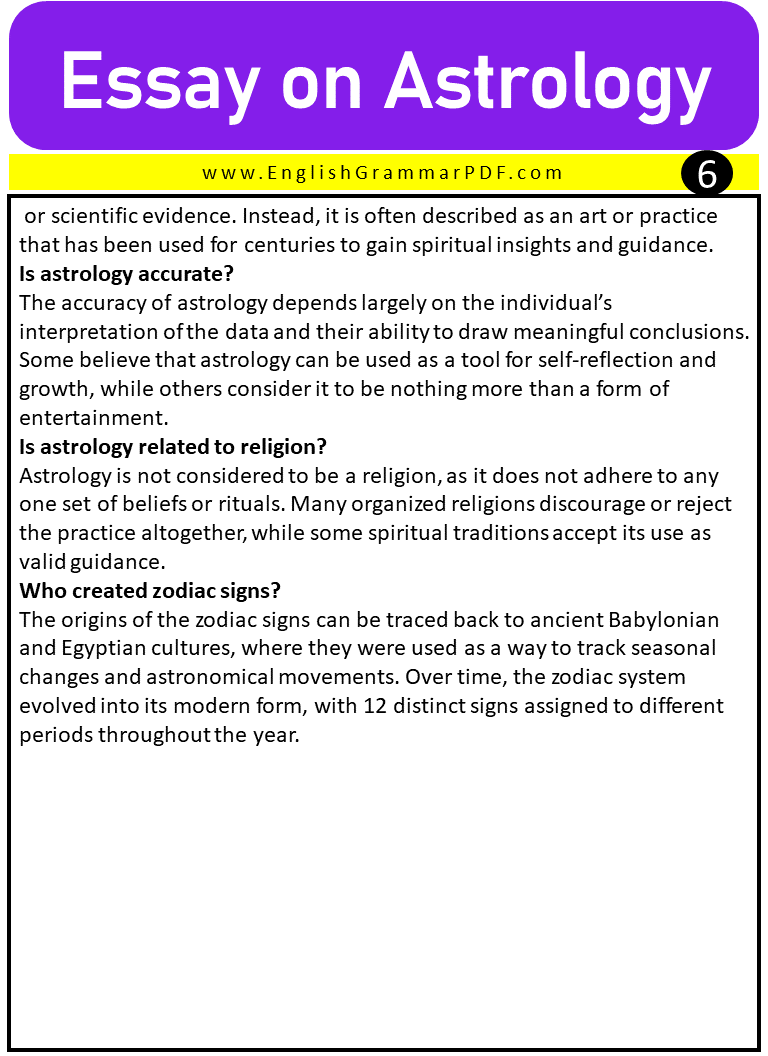Essay On Astrology (Structure/Outline)
- Introduction
- Origin and History of Astrology
- Symbols and Signs in Astrology
- Principles of Astrology Practicing
- Importance of Astrology
- Effects of Practicing Astrology
- Theological View on Astrology
- Criticism on Astrology
- FAQ’s
Introduction
Astrology, a practice that dates back to ancient times, is the study of the positioning and movements of celestial bodies to explore the potential impact on earthly events. It’s been used for centuries as a way to interpret personal fortunes or to make predictions. Astrological practices have changed over time; however, it is still one of the most widely-practiced forms of divination today.
Origin and History of Astrology
Astronomy, the scientific study of celestial bodies such as planets, stars, and galaxies is a relatively modern field. However, many ancient cultures had their interpretations of the skies that often included religious or spiritual meanings.
This dates back to prehistoric times when people would use the stars as a way to mark seasonal changes and time-keeping. It wasn’t until the early Babylonian civilization that astrology, as we know it today, began to take shape.
The ancient Babylonians used an observational approach to studying the skies, developing a system of celestial interpretation known as “astronomy-astrology”. This practice spread throughout the world, eventually making its way to the Middle East, India, and Europe.
Discover More:
Symbols and Signs in Astrology
The most recognizable part of astrology is the use of symbols to represent different celestial bodies, such as planets and stars. Each symbol has its unique meaning that can be interpreted based on its placement within a chart or reading.
For example, the symbol for the sun is a circle with a dot in the center and is typically associated with energy, life, and vitality. Other symbols include the moon, which is usually represented by a crescent; Venus, which is shown as a cross; and Mars, which has an arrow pointing up.
Zodiac signs:
In addition to the various celestial symbols, astrology also uses the 12 zodiac signs to categorize and identify certain types of personalities. Each sign is associated with a constellation and has its own set of characteristics and traits that are used to describe someone’s personality.
(1) Aries:
Symbolized by a ram, Aries is known for its independent and daring nature. People born under this sign are typically adventurous, assertive, and determined.
(2) Taurus:
Represented by a bull, Taurus is an Earth sign associated with stability, reliability, and loyalty. People born under this sign are often patient and reliable, but can also be quite stubborn.
(3) Gemini:
Symbolized by two twins, Gemini is an Air sign known for its adaptability and communication skills. People born under this sign tend to be sociable and open-minded, as well as quick thinkers.
Principles of Astrology Practicing
The practice of astrology is based on the idea that our lives are interconnected with the natural cycles of the universe. This means that aspects such as our birth dates, geographical locations, and environment can all influence our personalities and outcomes. Through interpreting these elements, a skilled practitioner can gain insight into a person’s past, present, and future.
The practice of astrology also involves understanding the relationships between the planets and their movements. This is known as “aspecting” and it involves looking at how certain constellations, such as stars, align with each other to reveal patterns or hidden meanings. Different aspects can represent different moods or feelings, and even have the potential to predict future events.
These interpretations are based on a variety of principles, such as:
- Aspects: The various angles between planets and stars can be interpreted to identify patterns or trends in behavior.
- Houses: Each sign is divided into 12 houses which represent different areas of life and can be used to predict how those areas will be affected by celestial influences.
- Transits: Transits refer to the movement of planets through the sky and can be used to identify short-term trends or changes in a person’s life.
Importance of Astrology
The practice of astrology is important because it serves as an aid in decision-making and self-reflection, providing insight into our lives that we may not otherwise be aware of. It can help us better understand ourselves, our relationships, and our place in the world. It can also provide guidance when we are facing difficult life choices, helping to clarify our thoughts and feelings so that we can make more informed decisions.
Effects of Practicing Astrology
Practicing astrology can have both positive and negative effects depending on how it’s used. On one hand, understanding the influence of the stars and planets can provide important insight into our lives and help us gain a greater understanding of ourselves.
On the other hand, it can lead to dependency on astrological readings instead of using our own intuition or decision-making skills. Ultimately, how one uses astrology is up to them; however, it’s important to remember that its main purpose is to provide guidance and insight, not to be used as a crutch or replacement for our judgment. Astrology continues to be a popular form of divination today, with millions of people using it as a source of spiritual guidance and personal reflection.
Whether you’re looking for advice or simply want to understand yourself better, astrology can be a powerful tool to help you gain clarity and move forward in life. No matter how it’s used, one thing is certain: the power of astrology has been around for centuries and its influence will continue for generations to come.
Theological View on Astrology
The theological view on astrology is a bit more complicated than the one presented in this article. In general, most organized religions discourage or even reject the practice of astrology, considering it to be a form of divination and thus contrary to their beliefs. However, some spiritual traditions accept its use as valid, instead deeming it to aid in self-reflection and spiritual growth.
In the end, whether or not one chooses to practice astrology is a personal decision that should be made with great care and consideration. No matter what your belief system may be, it is important to remember that astrology is ultimately an individual choice and should never be used to make decisions or cause harm to others.
It is important to understand its potential effects, both positive and negative, before engaging in the practice. With that said, if used responsibly, astrology can offer valuable insight into our lives and be a powerful tool for self-exploration.
Overall, practice caution when it comes to astrology: use it only as guidance and never as a replacement for your own intuition or decision-making skills. With that said, astrology can be a valuable tool for self-reflection and spiritual growth when used responsibly. Ultimately, it’s up to you to decide how you wish to use this ancient practice.
Criticism on Astrology
Critics of astrology argue that its predictive power is based on coincidence rather than fact. They point out that astrological readings are often vague and can be interpreted in many different ways, leading to subjective results.
Furthermore, they maintain that the practice of astrology relies heavily on confirmation bias—that is, drawing conclusions based on a person’s existing beliefs and expectations.
In addition, some critics argue that astrology can be used to manipulate or exploit people, as the “predictions” it provides are often generalized enough to apply to anyone.
As such, they claim that astrological readings can be used in unethical ways by those who wish to manipulate others into believing what they want them to believe.
FAQ’s
What is the true meaning of astrology?
The true meaning of astrology is the study of the movements and relative positions of celestial bodies, which are interpreted as influencing the natural world and human lives. It can be used to gain insight into our personalities and relationships, as well as guide us in making important decisions.
Is astrology a science?
Astrology is not considered a science, as it does not rely on empirical facts or scientific evidence. Instead, it is often described as an art or practice that has been used for centuries to gain spiritual insights and guidance.
Is astrology accurate?
The accuracy of astrology depends largely on the individual’s interpretation of the data and their ability to draw meaningful conclusions. Some believe that astrology can be used as a tool for self-reflection and growth, while others consider it to be nothing more than a form of entertainment.
Is astrology related to religion?
Astrology is not considered to be a religion, as it does not adhere to any one set of beliefs or rituals. Many organized religions discourage or reject the practice altogether, while some spiritual traditions accept its use as valid guidance.
Who created zodiac signs?
The origins of the zodiac signs can be traced back to ancient Babylonian and Egyptian cultures, where they were used as a way to track seasonal changes and astronomical movements. Over time, the zodiac system evolved into its modern form, with 12 distinct signs assigned to different periods throughout the year.
Essay On Astrology Pdf
